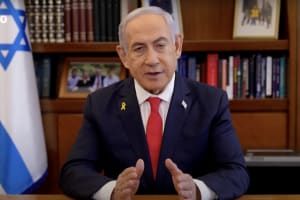A man poses next to a picture of late Hezbollah senior leader Ibrahim Aqil, ahead of the funeral of Ibrahim Aqil and of Hezbollah member Mahmoud Hamad, who were killed in Friday’s Israeli strike on Beirut’s southern suburbs, in Beirut, Lebanon, September 22, 2024. (Photo: REUTERS/Amr Abdallah Dalsh)
Israel’s recent elimination of top Hezbollah terrorist commander Ibrahim Aqil and a dozen senior Hezbollah commanders was a severe blow to the Iranian-backed Lebanese terrorist organization Hezbollah, which openly calls for Israel’s destruction.
While Israel remains Hezbollah’s main target, families of the U.S. victims welcomed Aqil’s death, as he was considered one of the world’s most dangerous terrorists.
Washington had placed a $7 million bounty on Aqil’s head for his involvement in the deadly bomb blasts against the U.S. Embassy in Beirut and U.S. Marine barracks in 1983.
More than 350 people were killed in the two attacks, the vast majority of them Americans, including soldiers, CIA officers, journalists, and embassy staff. The latter attack also claimed the lives of dozens of French soldiers.

Damage to the U.S. Embassy after the bombing in Beirut, 1983 (Photo: US Army/Public Domain)
Retired U.S. Marine Corps Sergeant Major Steve Aiken welcomed Israel’s elimination of Aqil as “God’s judgment,” and a powerful message to the ayatollah regime in Tehran.
“You might get away, but you’re not going to get by,” Aiken assessed. “Our memory is long. Israel’s is even longer.”
The families of Aqil’s terror attack victims and survivors believe justice has now been served, even if it took over four decades to eliminate the terrorist.
Catherine Votaw, whose father Albert was killed in the Hezbollah embassy bombing attack, is still haunted by the 1983 tragedy.
“You know, my story is just one of those tiny tragedies. Big tragedy for me. Big tragedy for my family,” Votaw told The Washington Post. “Everybody suffered these tremendous tragedies that blew their lives apart.”
Retired U.S. Ambassador Ryan Crocker (75) who survived the embassy attack, also welcomed the elimination of the top Hezbollah terrorist commander.
“We’ve been engaged with Hezbollah for a very long time,” Crocker said. “It is still a source of some satisfaction that he [Aqil] finally got it.”
At the time of the embassy attack, Crocker served as a political attaché on the fourth floor of the building when a suicide bomber slammed and detonated a van packed with explosives into the front of the building. “It was pitch-black except for the fires,” he recalled.
On Sunday, the Israeli military revealed that Aqil and the other senior Hezbollah commanders were reportedly plotting to carry out an Oct. 7-type attack against northern Israeli communities.
In a recent interview with British Sky News, Israeli President Isaac Herzog said it was time to make Israel’s north safe from terrorism once again so residents can return to the homes they’ve been forced to evacuate since last October.
The Israeli president emphasized that Israel’s fight against terrorists is not only for the benefit of the Jewish state.
“I believe our friends should understand that we are fighting their war too. In the long term, you have to understand that there is an empire of evil, which really thinks and believes as part of an ideology, in the jihadist ideology, in conquering the Middle East and moving on into Europe and the rest of the world,” Herzog said.
































